Does Islam Permit Female Imams?
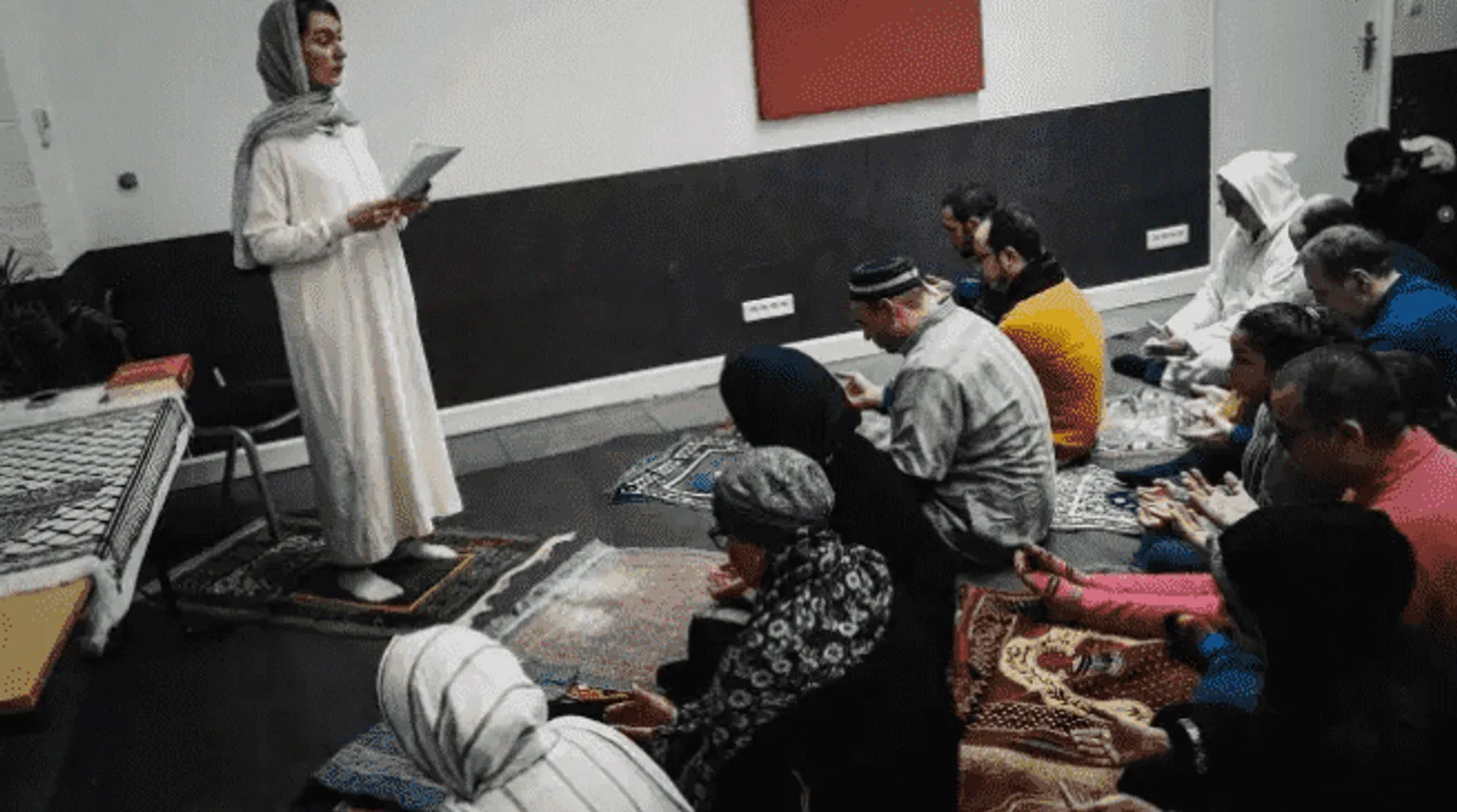
By Missionary Safeer Ahmad Zartasht
Why are there no Female Imams?
This question has arisen especially in recent times as women’s rights have come to the fore. There are also examples of people starting their own communities now with female imams in different parts of the world. Let’s look at this issue from different angles.
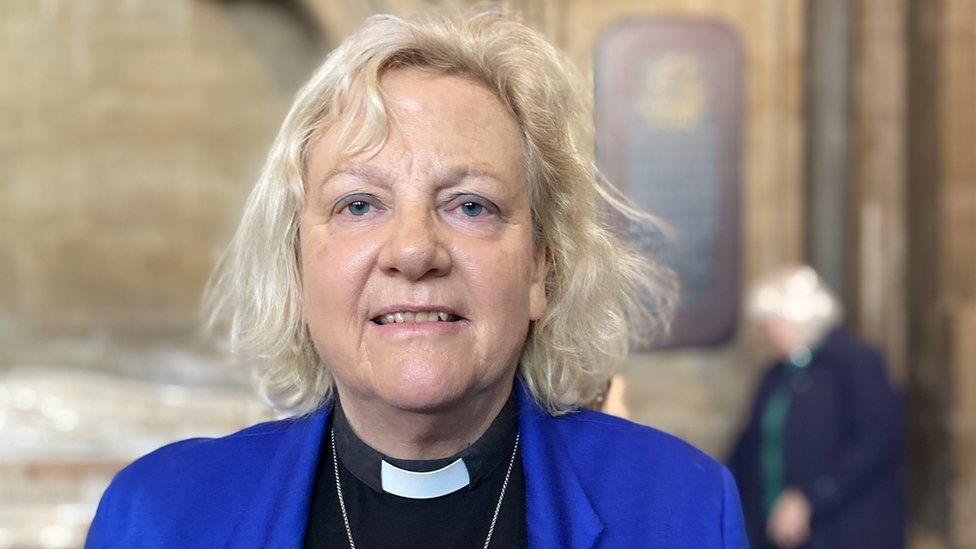
The criticism is that if Islam regards women and men as equal, then why should women not be permitted in orthodox Islam to take the role of Imams? This issue has become all the more acute since 1994, when the Church of England ordained its first female priests, and the focus on Islam has become more intense.
Pioneering Muslim Women
The issue of female equality in Islamic communities was not raised first by the West, but by female Muslim companions of the Prophet Muhammad (sa) himself, fourteen centuries ago. On the issue of equality, during one sitting of the Prophet of Islam, Hazrat Asma bint Yazid (ra) asked a question pertinent to the discussion at hand. She asked:
She went to Prophet Muhammad (sa) and said:
“O Messenger of God, I am sent by a group of Muslim women and we all share the same view and have the same concern. Allah has sent you to both men and women. We believe in you and follow you. Yet we, women, have to stay at home. We are the object of men’s desire and we bear their children. Nevertheless, men have privileges, such as the obligatory Friday prayer, attending funerals and going on jihad campaigns. When they leave for jihad, we look after their property and we rear their children. Messenger of God, do we have a share of reward for doing so?”
Al-Mu’jam al-Kabir by al-Tabarani.
The Prophet turned to the men attending him and said: “Have you ever heard a more eloquent woman putting a case concerning her faith?” They said: “We never thought that a woman can be so expressive”. The Prophet said to her: “Asma, go and tell women that when any of you is a goodly wife, giving her husband a pleasant life and cutting out friction, she earns a reward equal to all that you have mentioned of men’s reward”.
This shows how intelligent and wise this female companion was and it also shows the respect and regard the Prophet (sa) had for women and their efforts.
What this narration tells us is that Islam, from the outset, recognised two important matters:
- The equal value of men and women in the eyes of God.
- The different roles of men and women in society.
It is the failure to appreciate the nuanced difference between the above two points that has led some people to make objections to the Islamic attitude towards the two genders. Indeed, the equality of value between men and women is made abundantly and categorically clear in the Quran:
“Surely, men who submit themselves to God and women who submit themselves to Him, and believing men and believing women, and obedient men and obedient women and truthful men and truthful women, and men steadfast in their faith and steadfast women, and men who are humble and women who are humble, and men who give alms and women who give alms, and men who fast and women who fast, and men who guard their chastity and women who guard their chastity, and men who remember Allah much and women who remember Him — Allah has prepared for all of them forgiveness and a great reward.”
Holy Quran 33:36
According to Islamic history, this verse was revealed to the Prophet of Islam (sa) at the occasion of one of the female companions asking the Prophet (sa) why women were not mentioned in the Quran as frequently as men. Some historical accounts record his own wife, Hazrat Umm Salamah being the questioner, while others record Hazrat Asma’ bint ‘Umays (ra) as the questioner.
This is not the only verse of the Quran to clarify this point. Early in the Quran, Allah makes clear the equality in his eyes between men and women:
“So their Lord answered their prayers, saying, ‘I will not allow the (good) work of any worker from among you, whether male or female, to be lost. You are from one another.“
Holy Quran 3:196
So, from the Quran it is very clear that as individuals there is no discrimination of reward for men or women. Then why don’t we see female Imams? Indeed, why have there not even been any female prophets in history, according to Islam? Were there no women pious enough to act as God’s messengers to mankind?
To understand the reasoning behind why women, in Islam, have equal value, but different roles, we will have to look at a few important factors.
Menstruation and the Role of the Imam
It’s very important to look at the role of Imam to understand what this specific role demands.
An Imam has a demanding task in leading the prayers for a congregation on a daily basis. This is five times a day, every day, in addition to other activities that require consistent availability, such as classes, counsels, talks and meetings with the congregation. An Imam has to be available at all times and is expected to be present at the centre of the mosque. He can be called upon any time and will have to be present. Now, if one was to put a woman in such a role, she would most certainly be capable of fulfilling the task in most ways, however, it would likely be a burden on her, more than for a man.
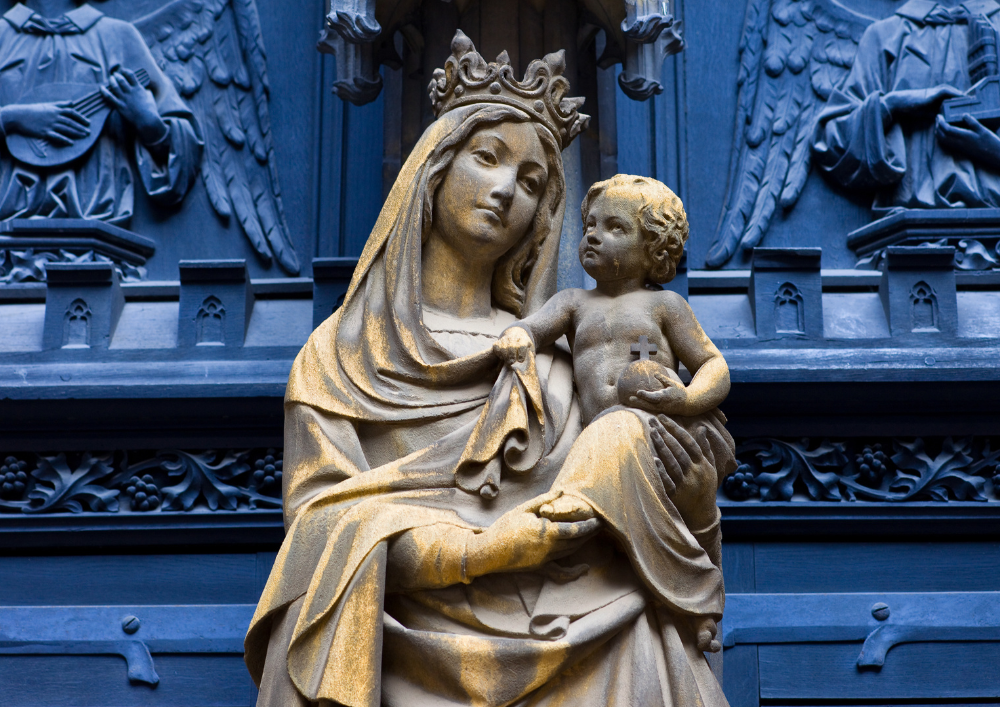
This is due to the fact that women are exempt from praying during their menstruation cycle, as a mercy for them, according to Islam. God does not expect women to offer prayers in a state where one can have symptoms of cramping, pain, bleeding, anaemia and tiredness etc. Requiring women to pray during this time is regarded as neither practical nor fair and so women are exempted in Islam. Hence, it would not be possible for women to pray and lead prayers at the mosque and they would likely not be available for religious ceremonies involving prayers, at that time either.
So, God has Himself given this ease and opportunity to rest for women, when they are going through a difficult time, without them losing any reward because of that. While Christianity views menstruation as a punishment for women from the inherited sin of Eve, Islam regards such an idea as mythical, regarding this time instead as a natural part of a woman’s bodily system and not as a punishment for any inherited sin.
On this point, the Prophet of Islam, Muhammad (sa) advised the following:
“So when the real menses begin, give up your prayers and when it (the period) has finished, wash the blood off your body (take a bath) and offer your prayers.“
Sahih al-Bukhari 306
Muslim women do not need to pray during this time and they do not have to worry about making up for those prayers. When it comes to the period itself, all women know that period can be an uncomfortable thing. Now, some might say that some women will still be able to do it, but Islam is a universal religion that want to bring ease and practicality to all. Permitting women to lead as Imams would entail requiring all women to pray during their menses. This would therefore result in considerable hardship for all Muslim women, for all time. This is contrary to the spirit of Islam:
“Allah desires to give you facility and He desires not hardship for you.“
Holy Quran 2:186
So, for a week of every month, three months a year, approximately, a woman is not required to pray. Men do not have this requirement, and are better suited therefore to be imams. This is not because they are more pious or better. It is simply for practical reasons.
In the pursuit of women’s rights, it’s important to not ignore the fact being equal doesn’t mean being identical and that’s the beauty of male and female that they both have different skills, make for a healthy balance to life. Men and women are not and can not be the same physically or emotionally. Islam recognises this fact at the outset.
Motherhood
Now, let’s look at the role of motherhood in this discussion, too. Being a mother is very demanding and a huge responsibility. Of course, both parents have responsibilities of taking care of children and spending time with them. However, no one can deny how important the role of a mother is in the upbringing and nurturing of a child. A baby is naturally more attached and dependent on its mother than its father in its early years, by virtue of the natural bond the child possesses during pregnancy and breastfeeding. A father cannot be a mother, however much he tries to.
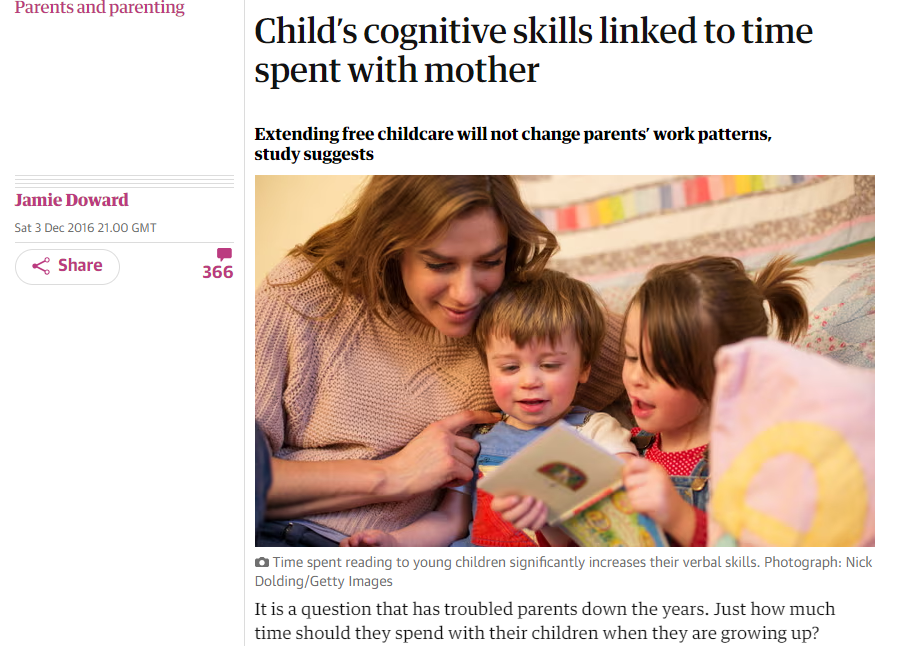
Extensive research shows how crucial maternal affection and attention is to healthy development of a child.
According to the Guardian, one study by academics from the University of Essex and University College London which analyses representative data on more than 8,000 children and their mothers, found that the positive effect of mothers spending time with their children was large. It was equivalent in magnitude to between 20% and 40% of the advantage that young children enjoy from having a mother with a university degree, as opposed to having a mother with no qualifications.
“Our results emphasise that the time spent by mothers with their children has a noticeable influence on early child development,” said one of the co-authors of the study, Professor Marco Francesconi. The researchers also found that the level of education attained by a mother has an effect on early years development (The Guardian; Jamie Doward, Sat 3 Dec 2016).

Allah says in the Holy Quran that weaning of a child can take 2 years:
“And mothers shall give suck to their children for two whole years; this is for those who desire to complete the suckling. And the man to whom the child belongs shall be responsible for their (the mothers’) food and clothing according to usage. No soul is burdened beyond its capacity. The mother shall not make the father suffer on account of her child, nor shall he to whom the child belongs make the mother suffer on account of his child, and the same is incumbent on the heir.”
Holy Quran 2:234
How can a female Imam lead prayers five times a day, the first one being in the pre-dawn period, if she is a mother who has to breastfeed the baby and constantly look after their demanding needs? Is it even fair to expect a woman to do both? Motherhood in itself is a means of earning reward which Allah has promised to believing women. God says in the Quran:
“And We have enjoined on man concerning his parents — his mother bears him in weakness upon weakness, and his weaning takes two years — ‘Give thanks to Me and to thy parents. Unto Me is the final return.”
Holy Quran 31:15
The importance of women fulfilling the role of motherhood in the best way for the raising of the next generation is no trivial matter. It is a matter that is crucial to the mental and psychosocial health of future generations. This was a matter greatly emphasised by the Prophet Muhammad (sa) himself. On this point, he famously stated:
“Paradise lies under the feet of your mother.”
Sunan Nisai 3104
While this saying is often used to convince unruly children to listen to their mothers, a deeper message can be understood from it also. That is, for society to resemble paradise, the key lies in the indispensable role of motherhood.
Hence, the sacrifices a mother has to make do not go in vain. Man is forever indebted to his parents and especially his mother. A mother neglecting this crucial duty of care will have to be answerable to God Almighty. As such, why would God place on women such a burden that would make difficult the discharge of this essential societal duty?
Focusing on God
Islamic prayer (salat) is composed of different physical postures. Out of respect for their dignity, women stand behind men in the Islamic prayer. This is not because women are lesser in piety or status. Not at all. The reason is simply this, that the Islamic prayer postures, involving bending down, and then entering into prostration, would make some women feel self-conscious if they knew men were standing immediately behind them. For men also, it may be a source of distraction to them.
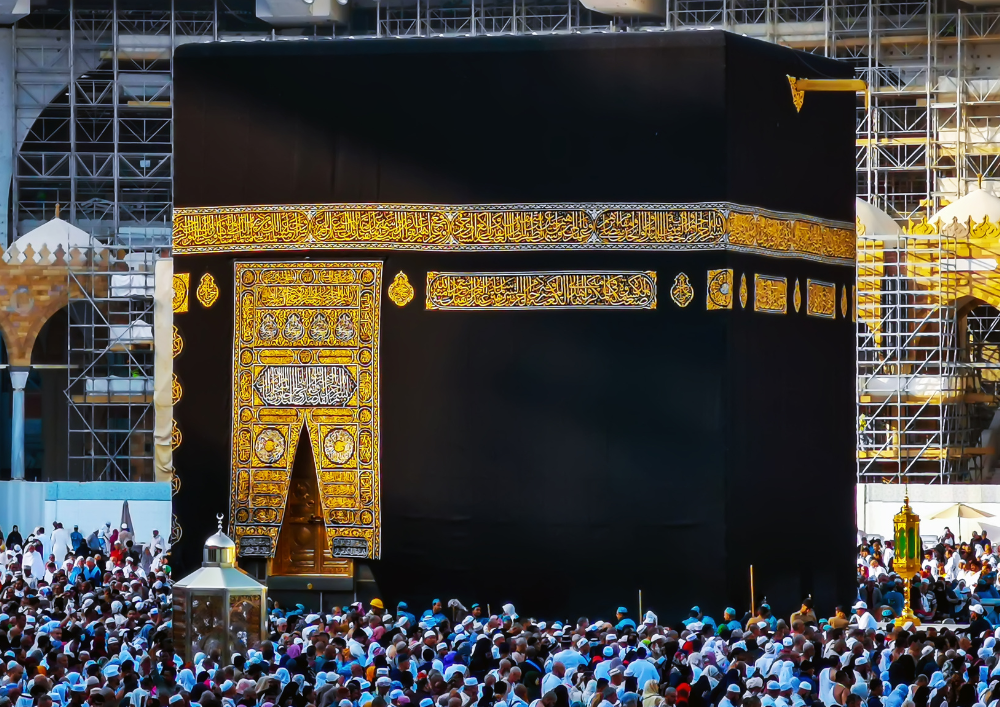
Since the whole purpose of prayer is to focus on God and nothing else, no other distractions should be there. When you have men and women praying together, standing shoulder to shoulder and a woman standing in front of men, it becomes impossible to not be aware or conscious of one another. Islam is a religion that takes into account human nature and the realities of life. This creates complications for attention and focus in prayers. There is then a possibility of someone acting or thinking in an indecent way. This will disrupt the prayer, the atmosphere and the sanctity of the whole mosque. For this reason too, women do not lead the prayer of men, but do lead the prayer of other women or of children, whether boys or girls.
In reality, this gives the women complete freedom to offer their prayers behind men or in a separate area, without being embarrassed by the presence of men behind or beside themselves. They do not have to worry about their own appearance or clothing. It also follows then that a woman cannot lead a congregation of men, but she can lead a congregation of women. She can also lead a congregation of children of either gender, but not adult men.
His holiness Hazrat Mirza Masroor Ahmad (aba), worldwide head of the Ahmadiyya Muslim community has discussed this issue as well.
Pious Women are Examples for Believers
While women are not therefore appointed as Imams of mosques etc., the Quran does not put their status as less than men. In fact, the Holy Quran Allah has set forth two excellent examples of women for all believers, whether men or women, to follow and gain inspiration from:
“And Allah sets forth for those who believe the example of the wife of Pharaoh when she said, ‘My Lord! build for me a house with Thee in the Garden; and deliver me from Pharaoh and his work, and deliver me from the wrongdoing people; ’And the example of Mary, the daughter of ‘Imran, who guarded her private parts — so We breathed into him of Our Spirit — and she fulfilled in her person the words of her Lord and His Books and was one of the obedient.”
Holy Quran 66:12-13
In these verses, all believers, men and women, are given the examples of Asiya bint Muzahim, wife of Pharaoh and Mary, the mother of Jesus, as models to follow. Both men and women are informed, in these verses, of the need to exhibit their qualities in order to become truly righteous. If women were regarded in Islam as spiritually inferior, why would God give the example of two women for men to follow?
As regards obtaining of knowledge and indeed teaching to men, the Holy Prophet Muhammad (sa) encouraged Muslims to earn half their faith from Aisha (ra), his wife, which again emphasises the role of women and the recognition of their qualities. So, there is nothing stopping women from seeking education or high status in Islam, in fact it is something that is encouraged.
The fact is that Islam gave women rights of inheritance, education, work, consent, divorce and choosing of partner, long before any such rights were given in the modern era. Any differences in Islam’s treatment of men and women are because Allah, our Creator, understands the capabilities and responsibilities of men and women and doesn’t put unnecessary burden on either. Only, if we understand the strengths and capabilities of men and women and complement each other, rather than trying to compete against each other continuously, can we fulfil our rights to each other and create a paradise on Earth.
More articles
Contact
National Outreach Department:181 London Rd, Morden SM4 5PT, U.K.
Email: [email protected]Phone: 0208 6877804
@ 2025 Ahmadiyya Muslim Community, All Rights Reserved.